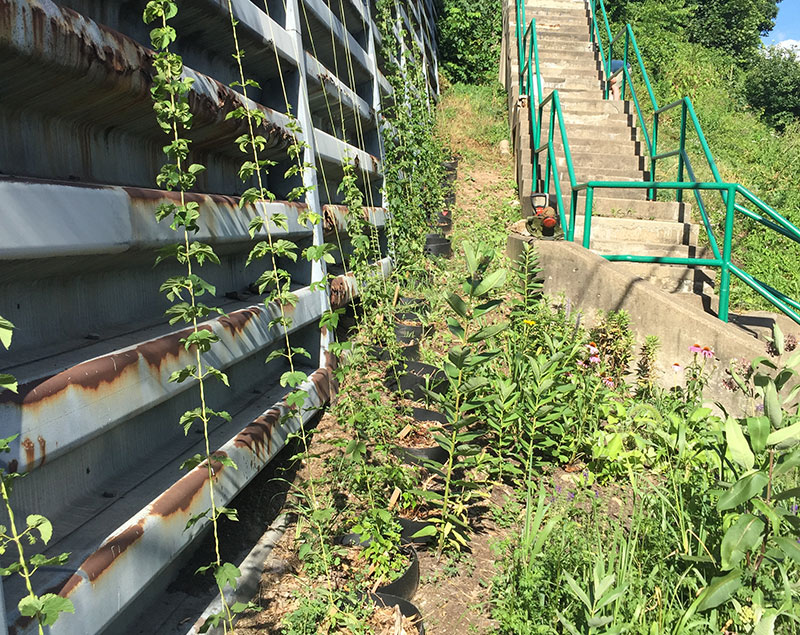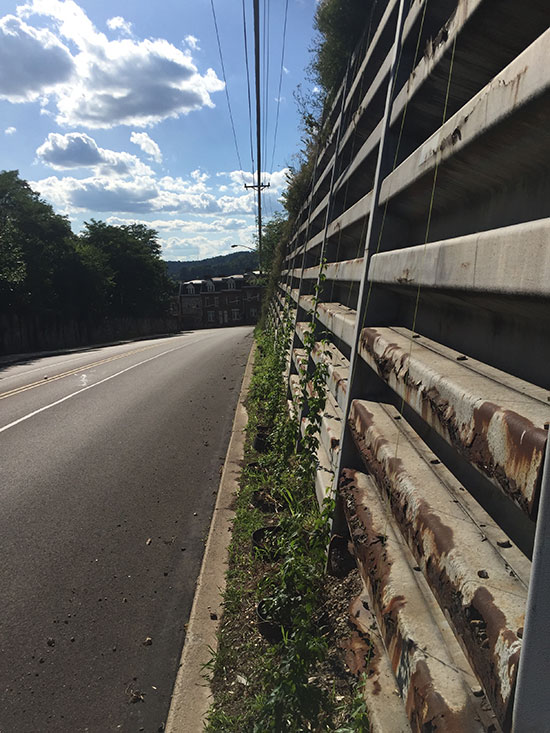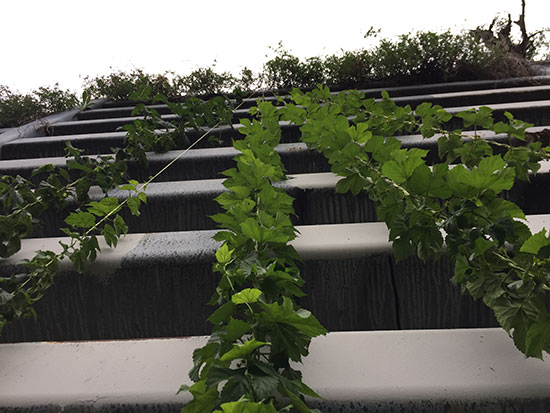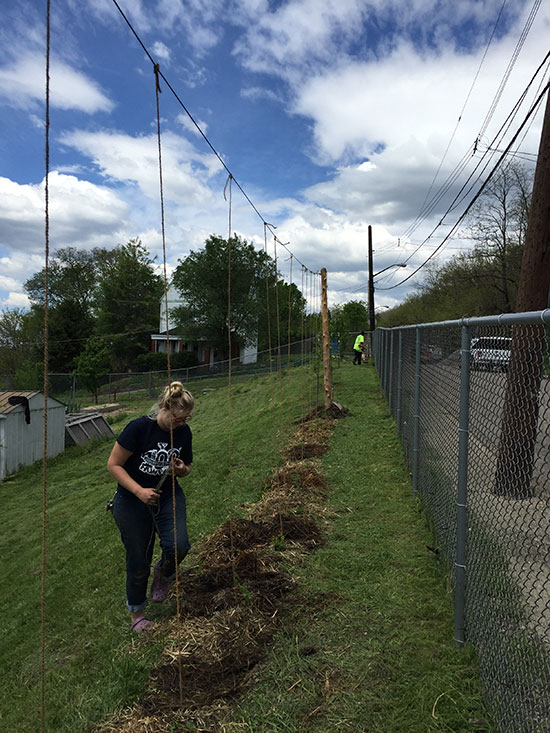Growing Hops in Abandoned Lots? Pittsburgh Will Drink To That
Abandoned lots in Pittsburgh are now growing hops used to make truly local brews.
Growing Hops in Abandoned Lots? Pittsburgh Will Drink To That
Abandoned lots in Pittsburgh are now growing hops used to make truly local brews.

The humble hop – that vigorous perennial, which steadily climbs upward, thriving on water and a string – is the main character of a story, one that will hopefully be told in other areas of this city’s landscape, through Hops on Lots Pittsburgh (HOLP), a project started after Pete Bell attended a community garden class by Grow Pittsburgh. In Bell’s mind, a few ideas started – forgive us – brewing.
First, he wanted a garden to benefit an entire community, not just those who visited or worked it. And, he and his friend Joe Chmielewski were looking for something fulfilling to do outside of work. “We also drink our fair share of beer,” Bell says.
When a coworker was talking about brewing at home and how expensive hops are, Bell jokingly asked about growing his own.
Then, he realized, why not?
After all, many of the growing number of craft breweries in Pittsburgh source their hops from non-local suppliers, like those in Oregon and Washington. Plus, hops seemed relatively easier: You can could avoid the pest problems you face with other urban crops, since hops are so bitter. They also grow vertically, so they need little space on the ground. “I came up with an idea to grow brewing crops … to be used locally in a beer to be able to create a truly local beer,” Bell says.
Now, how about a setting? Like many cities across the Rust Belt, Pittsburgh has thousands of vacant properties (roughly 27,000) dotting the landscape like a burdensome rash. With its Adopt-A-Lot program, Pittsburgh residents find unused lots and lease them for free – which is a route Bell and Chmielewski initially pursued (and are still pursuing). They have yet to get an official city lot, but through the process, the duo was connected to Shelly Danko-Day, the city’s open space specialist, who introduced them to the Stanton Heights Community Association (SHCA). Fresh off of receiving a $1,000 Love Your Block grant from the city of Pittsburgh, the SHCA was hoping to spiff up Stanton Avenue’s retaining wall. “They planned to use the grant to clean up the area around the retaining wall and create a green entrance to their neighborhood,” Bell says. “We were asked and agreed to place hops along the wall.” Location: secured.
Along with Danko-Day, there are a multitude of outstretched hands working to make this project a success, including Marc Verez of Keystone Hop Farm in Slippery Rock, Pennsylvania, who donated all the supplies HOLP needed and a team of volunteers. But they have also had a few bumps in the road.
“There is nothing like watering plants two feet from a fairly busy road,” says Bell, referring to the hops sprouting up along Stanton Avenue. Since the site lacks a water source, Bell and Chmielewski – along with community leader Mike Sturges, who has been working to help HOLP succeed in the Stanton Heights neighborhood – have to haul it in on their own. They must also battle the beautiful and persistent morning glory, trying to edge its way up a trellis meant for hops. A family of rats that lives behind the retaining wall dropped in when the trellis was being installed as well.


HOLP hopes to expand to new locations, but even though there are thousands of vacant lots in Pittsburgh, they can’t just pluck one at random. The amount of trees and sun, for example, must be considered, along with the interests and demands of the neighborhood. “One community we have been working with to find a location requires that for every tree we would take down, we would have to replace it at a location within the community,” says Bell. “That can add an extra cost to your overall budget if you have to take down 10 trees and replace them.”
Also, since the lots are urban areas, many of which used to contain basements slick with lead paint, Bell and Chmielewski must gather soil samples to test for contaminants. Hops are also sky-bound plants, so city zoning regulations must be considered when building a trellis system.
With all this in mind, Bell got in touch with Hanna Mosca, garden program director for the YMCA in Pittsburgh, when looking to secure a second location. He had spotted an empty, 10-foot flag pole standing in the garden of the Hazelwood YMCA. Where you and I might see an eyesore, Bell and Mosca saw an opportunity for a low trellis system. They erected another pole 40 feet away from the flag pole and connected their upper portions with wire. For the hops to have somewhere to climb, they anchored twine into the earth and looped it over the wire.

“Typically in large commercial hop farms, the trellis system is around 20 feet high. We are going with half the height for several reasons,” says Bell. “A 20-foot-high trellis system is not very aesthetically pleasing to your neighbors. And we also need to be able to harvest these hops. It is much easier to harvest when the plant is 10 feet high rather than 20. That way we really do not need any special equipment.”
The hops growing at both locations are destined for area breweries. Just blocks away from the Stanton Avenue retaining wall is Roundabout Brewery. They will brew a beer using the hops from the wall, with some of the proceeds going to benefit the Stanton Heights community. The hops planted at the Hazelwood YMCA are headed for beers made by Full Pint Brewery and Spoonwood Brewery. The beer will be on draft locally and the proceeds will benefit the YMCA.
Steve Ilnicki, head brewer and part owner of Spoonwood Brewery said partnering with HOLP was an obvious choice. “I think it’s the beginning of something that will become more prevalent in coming years, especially with the increased demand for brewing ingredients due to the continued growth of craft beer,” he says. “We get to be involved with a new enterprise, give back to a local community, and do what we love to do anyway – make beer.”
HOLP is still actively searching for a proper lot to lease from the city using the Adopt-A-Lot program. Bell and Chmielewski have been going through the process of acquiring a lot since last fall, and four times they got close but were turned away for reasons out of their hands, such as proximity to a flood prone creek and an abandoned rail line. “It’s a learning process,” Bell says.
They continue to water and weed where the hops are growing, though, anticipating a harvest sometime in late September with the beers coming out in October. “Imagine if each neighborhood had its own beer brewed for the purpose of supporting that particular community,” says Bell. “That’s what we are trying to do: Bring the communities, neighborhoods, and the breweries together.”
If you are interested in volunteering or need more information, visit HOLP. You can also follow them on Instagram at @hopsonlotspgh and Twitter at @hopsonlotpgh.
Follow us

This work is licensed under a Creative Commons Attribution-NoDerivatives 4.0 International License.
Want to republish a Modern Farmer story?
We are happy for Modern Farmer stories to be shared, and encourage you to republish our articles for your audience. When doing so, we ask that you follow these guidelines:
Please credit us and our writers
For the author byline, please use “Author Name, Modern Farmer.” At the top of our stories, if on the web, please include this text and link: “This story was originally published by Modern Farmer.”
Please make sure to include a link back to either our home page or the article URL.
At the bottom of the story, please include the following text:
“Modern Farmer is a nonprofit initiative dedicated to raising awareness and catalyzing action at the intersection of food, agriculture, and society. Read more at <link>Modern Farmer</link>.”
Use our widget
We’d like to be able to track our stories, so we ask that if you republish our content, you do so using our widget (located on the left hand side of the article). The HTML code has a built-in tracker that tells us the data and domain where the story was published, as well as view counts.
Check the image requirements
It’s your responsibility to confirm you're licensed to republish images in our articles. Some images, such as those from commercial providers, don't allow their images to be republished without permission or payment. Copyright terms are generally listed in the image caption and attribution. You are welcome to omit our images or substitute with your own. Charts and interactive graphics follow the same rules.
Don’t change too much. Or, ask us first.
Articles must be republished in their entirety. It’s okay to change references to time (“today” to “yesterday”) or location (“Iowa City, IA” to “here”). But please keep everything else the same.
If you feel strongly that a more material edit needs to be made, get in touch with us at [email protected]. We’re happy to discuss it with the original author, but we must have prior approval for changes before publication.
Special cases
Extracts. You may run the first few lines or paragraphs of the article and then say: “Read the full article at Modern Farmer” with a link back to the original article.
Quotes. You may quote authors provided you include a link back to the article URL.
Translations. These require writer approval. To inquire about translation of a Modern Farmer article, contact us at [email protected]
Signed consent / copyright release forms. These are not required, provided you are following these guidelines.
Print. Articles can be republished in print under these same rules, with the exception that you do not need to include the links.
Tag us
When sharing the story on social media, please tag us using the following: - Twitter (@ModFarm) - Facebook (@ModernFarmerMedia) - Instagram (@modfarm)
Use our content respectfully
Modern Farmer is a nonprofit and as such we share our content for free and in good faith in order to reach new audiences. Respectfully,
No selling ads against our stories. It’s okay to put our stories on pages with ads.
Don’t republish our material wholesale, or automatically; you need to select stories to be republished individually.
You have no rights to sell, license, syndicate, or otherwise represent yourself as the authorized owner of our material to any third parties. This means that you cannot actively publish or submit our work for syndication to third party platforms or apps like Apple News or Google News. We understand that publishers cannot fully control when certain third parties automatically summarize or crawl content from publishers’ own sites.
Keep in touch
We want to hear from you if you love Modern Farmer content, have a collaboration idea, or anything else to share. As a nonprofit outlet, we work in service of our community and are always open to comments, feedback, and ideas. Contact us at [email protected].by Meg Thompson, Modern Farmer
August 8, 2016
Modern Farmer Weekly
Solutions Hub
Innovations, ideas and inspiration. Actionable solutions for a resilient food system.
ExploreExplore other topics
Share With Us
We want to hear from Modern Farmer readers who have thoughtful commentary, actionable solutions, or helpful ideas to share.
SubmitNecessary cookies are absolutely essential for the website to function properly. This category only includes cookies that ensures basic functionalities and security features of the website. These cookies do not store any personal information.
Any cookies that may not be particularly necessary for the website to function and are used specifically to collect user personal data via analytics, ads, other embedded contents are termed as non-necessary cookies.